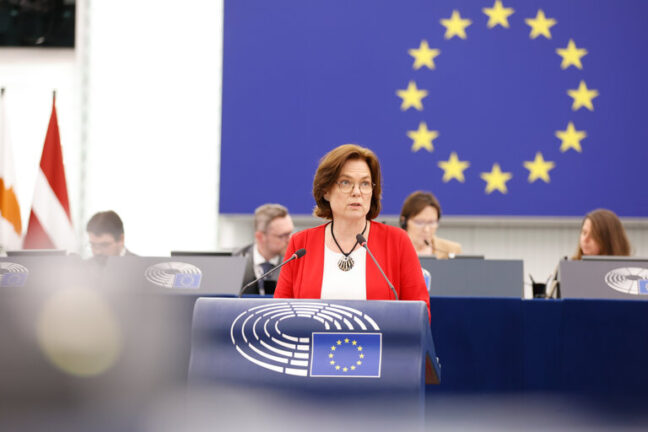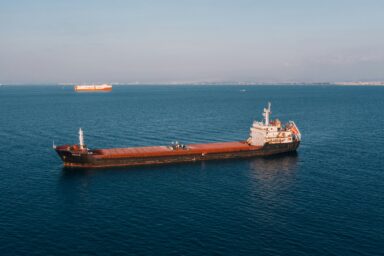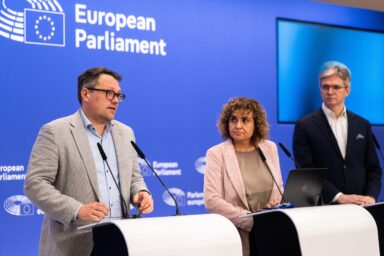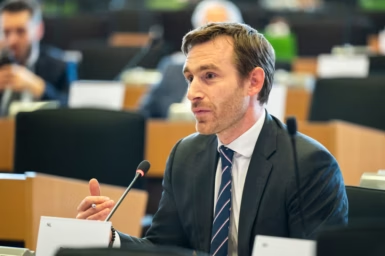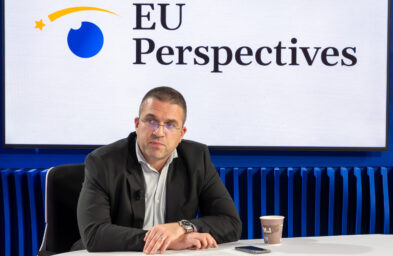MEPs have signalled their concerns over a proposed major shift in the direction of the European Social Fund Plus. Originally designed to tackle poverty and promote employment, it could soon serve other EU priorities, from defence preparedness to green industrial projects.
The European Parliament’s Employment and Social Affairs Committee (EMPL) adopted on Wednesday its position on amendments to the European Social Fund Plus (ESF+). To the chagrin of the MEPs, the Commission’s proposal would allow parts of the €142.7bn ESF+ budget to go to other uses. These include training workers for the arms industry, helping polluting companies decarbonise, and investing in critical technologies, such as semiconductors. Member states would benefit from looser spending rules and faster payouts.
For regions bordering Russia, Belarus or Ukraine, the proposal goes even further. Programmes in these areas would be eligible for 100 per cent EU funding and nearly 10 per cent in pre-financing. Member states that choose to re-allocate at least 15 per cent of their ESF+ envelopes to the new priorities of industry and defence would also receive a one-off pre-financing bonus of 4.5 per cent. They would also stand to gain an extra year to spend the funds, easing administrative burdens on national and regional authorities.
The aim, according to the Commission, is to provide flexibility and fast-track funding for urgent strategic priorities. These include re-skilling workers in carbon-intensive sectors or support for projects under the Strategic Technologies for Europe Platform (STEP). The latter is an initiative to boost investments in critical technologies and strengthen European competitiveness.
You might be interested
Parliament’s position
While the EMPL committee is not against widening the scope of the ESF+, it is worried about the priorities of the Commission. “This revision shows where the Commission really wants to go: less social policy, more money to a few strategic sectors. That is a dangerous change of course,” rapporteur Marit Maij (S&D/NL) said. “The European Social Fund Plus is for people, not for large defence companies.”
Instead, the committee is pushing for a reorientation that puts more emphasis on small businesses and workforce skills, rather than large industrial players. Micro, small, and medium-sized enterprises should enjoy preferential access to EU-support. It also demands a lower threshold for reallocation: where the Commission proposes a 15 per cent minimum to unlock incentives, MEPs suggest setting that limit at 10 per cent.
Additionally, the EMPL committee added a provision requiring EU countries to ensure that beneficiaries of the fund’s amended programmes respect working and employment conditions.
The committee’s position passed with 32 votes in favour, 15 against, and 11 abstentions.
Concerns over funds diversion
The parliamentary proposal echoes a broader concern that within the next Multiannual Financial Framework (MFF), social funding often winds up serving military goals and industrial competitiveness. In this spirit, former Commissioner for Jobs and Social Rights, Nicolas Schmit, strongly criticised the Commission’s proposal. “Now the worst might happen: The European Social Fund, the oldest EU Fund enshrined in the treaty should be sacrificed to defence and competitiveness! This VDL rightwing commission is not only dismantling the climate policy, it is also attacking social policy,” he posted on X.
I do not understand an MFF—a community budget—without such an important fund as the European Social Fund. – Spanish MEP Iratxe García Pérez, president of the S&D group
Some MEPs, however, welcomed the shift. MEP Sebastian Tynkkynen (ECR/FIN) questioned the value of the fund in its current form: “What have such shameless sums achieved? Has anyone outside this building even heard of the existence of such a fund?” he asked during the plenary session debate on the ESF+ earlier this year. “So when the current MFF comes to an end, and I am to say what I think is the best possible future for this social fund, the answer is very simple: Money for defence.”
Enlargement Commissioner Marta Kos insisted instead that the two issues are not separate. Europe’s social policy is inextricably linked to its geopolitical challenges, she says: “Some 95 million Europeans are at risk of poverty or social exclusion. This does not only imply social hardship, but especially a lost potential for our economy. To effectively address the challenges that Europe faces, we need to continue to invest in Europe’s most important resource, its human capital. The status quo is not an option anymore.”
Strenghtening social policy
While the committee acknowledges this link between social dimensions and the EU’s growth strategy, it would like to see a more decisive effort from the Commission to tackle poverty and inequality. In March, the European Parliament adopted a resolution calling for a strong, standalone EU fund to combat poverty and social exclusion. It argued that the current structure of the ESF+ does not go far enough in addressing deepening inequalities across the EU.
That resolution, for which Ms Maij was also rapporteur, passed with broad support from the centre-left and Greens. It urged the Commission to treat the fight against poverty as a political priority on a par with economic and security challenges. The resolution also reiterated the need for social investments that are people-centred, not just industry-driven. It placed strong emphasis on training and upskilling for the green and digital transitions, while responding to defence-related labour market needs.
“Labour markets are undergoing profound transitions, and social policy must evolve alongside them,” Ms Maij said. “The ESF+ should not only react to social problems, but also help anticipate and shape long-term change.” That vision resonated in the views of Lukas Sieper (NI/GER): “The ESF+ after 2027 must be one thing above all else – an education offensive for Europe.”
What’s next
The S&D group has signalled that the future ESF+ will play an important role in the negotiations on the next Multiannual Financial Framework (MFF). The Commission intends to use the talks to merge various funds to make redirection toward defence spending easier.
“I do not understand an MFF—a community budget—without such an important fund as the European Social Fund,” Iratxe García Pérez (S&D/ES), president of her parliamentary political group, said earlier this year. “[The Commission] won’t have a blank check from the Socialist group.”
And while the EPP-dominated Commission seems keen to redirect Europe’s social spending toward industry and military goals, the Parliament may take a different approach. MEP Siegfried Mureșan (EPP/RO) said: “The European Parliament will defend the social fund.”
Absent any objections to the Committee’s position during the next plenary session in Strasbourg, the Parliament can proceed to negotiations with the Council.
